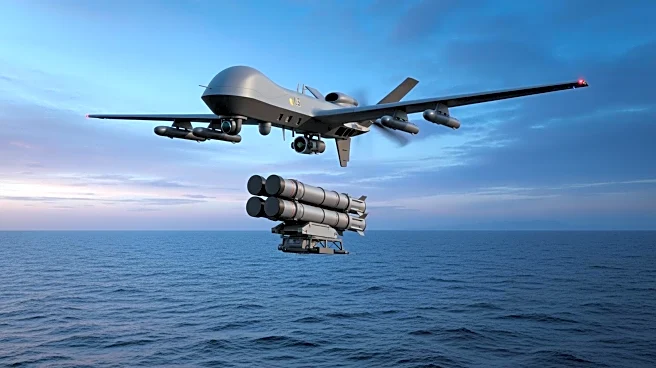What's Happening?
Defense Secretary Pete Hegseth announced a recent U.S. military strike on a vessel suspected of drug trafficking in the Caribbean near Venezuela. The operation, which resulted in the deaths of three individuals labeled as 'narco-terrorists,' is part of a series
of actions by the Trump administration targeting alleged drug traffickers in the region. The vessel was reportedly traveling along a known narcotics route and carrying substantial amounts of illicit drugs. This strike is the latest in a series of military interventions aimed at combating drug trafficking, particularly the influx of fentanyl into the United States. The Trump administration has framed these operations as part of an 'armed conflict' with drug cartels, treating traffickers as unlawful enemy combatants.
Why It's Important?
The U.S. military's actions in the Caribbean reflect President Trump's focus on addressing the opioid crisis, which has had significant impacts across the country. The administration's aggressive stance against drug trafficking is intended to curb the flow of fentanyl, a potent opioid often mixed with other drugs, leading to fatal overdoses. The strikes have sparked controversy, with regional governments and some U.S. lawmakers questioning the legality and ethical implications of such military interventions. Critics argue that these actions may infringe on the sovereignty of Latin American nations and call for greater transparency regarding the identities of those targeted.
What's Next?
The Trump administration plans to expand military interventions against suspected drug traffickers, with a new Joint Task Force led by U.S. Southern Command. Venezuela has threatened to declare a state of emergency in response to the strikes, vowing to defend its sovereignty. Meanwhile, a bipartisan group of U.S. senators has introduced a resolution to prevent further military action in Venezuela without congressional authorization. The resolution is expected to be voted on soon, potentially influencing the administration's future actions in the region.
Beyond the Headlines
The ongoing military operations raise questions about the scope of presidential war powers and the role of U.S. military force in Latin America. The strikes have reignited debates over the ethical and legal dimensions of treating drug traffickers as enemy combatants. Human rights groups and lawmakers are calling for more transparency and accountability in these operations, highlighting the need for a balanced approach that respects international law and human rights.















